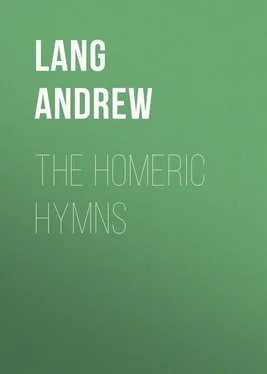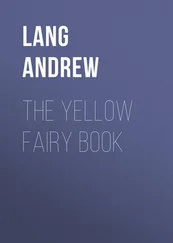Andrew Lang - The Homeric Hymns
Здесь есть возможность читать онлайн «Andrew Lang - The Homeric Hymns» — ознакомительный отрывок электронной книги совершенно бесплатно, а после прочтения отрывка купить полную версию. В некоторых случаях можно слушать аудио, скачать через торрент в формате fb2 и присутствует краткое содержание. Жанр: foreign_antique, foreign_prose, на английском языке. Описание произведения, (предисловие) а так же отзывы посетителей доступны на портале библиотеки ЛибКат.
- Название:The Homeric Hymns
- Автор:
- Жанр:
- Год:неизвестен
- ISBN:нет данных
- Рейтинг книги:4 / 5. Голосов: 1
-
Избранное:Добавить в избранное
- Отзывы:
-
Ваша оценка:
- 80
- 1
- 2
- 3
- 4
- 5
The Homeric Hymns: краткое содержание, описание и аннотация
Предлагаем к чтению аннотацию, описание, краткое содержание или предисловие (зависит от того, что написал сам автор книги «The Homeric Hymns»). Если вы не нашли необходимую информацию о книге — напишите в комментариях, мы постараемся отыскать её.
The Homeric Hymns — читать онлайн ознакомительный отрывок
Ниже представлен текст книги, разбитый по страницам. Система сохранения места последней прочитанной страницы, позволяет с удобством читать онлайн бесплатно книгу «The Homeric Hymns», без необходимости каждый раз заново искать на чём Вы остановились. Поставьте закладку, и сможете в любой момент перейти на страницу, на которой закончили чтение.
Интервал:
Закладка:
Aphrodite has better claims than most Greek Gods to Oriental elements. Herodotus and Pausanias (i. xiv. 6, iii. 23, I) look on her as a being first worshipped by the Assyrians, then by the Paphians of Cyprus, and Phœnicians at Askelon, who communicated the cult to the Cythereans. Cyprus is one of her most ancient sites, and Ishtar and Ashtoreth are among her Oriental analogues. She springs from the sea —
“The wandering waters knew her, the winds and the viewless ways,
And the roses grew rosier, and bluer the sea-blue streams of the bays.”
But the charm of Aphrodite is Greek. Even without foreign influence, Greek polytheism would have developed a Goddess of Love, as did the polytheism of the North (Frigga) and of the Aztecs. The rites of Adonis, the vernal year, are, even in the name of the hero, Oriental. “The name Adonis is the Phœnician Adon , ‘Lord.’” 15 15 “Golden Bough,” i. 279. Mannhardt, Antike-Wald-und Feldkulte , p. 274.
“The decay and revival of vegetation” inspires the Adonis rite, which is un-Homeric; and was superfluous, where the descent and return of Persephone typified the same class of ideas. To whatever extent contaminated by Phœnician influence, Aphrodite in Homer is purely Greek, in grace and happy humanity.
The origins of Aphrodite, unlike the origins of Apollo, cannot be found in a state of low savagery. She is a departmental Goddess, and as such, as ruling a province of human passion, she belongs to a late development of religion. To Christianity she was a scandal, one of the scandals which are absent from the most primitive of surviving creeds. Polytheism, as if of set purpose, puts every conceivable aspect of life, good or bad, under divine sanction. This is much less the case in the religion of the very backward races. We do not know historically, what the germs of religion were; if we look at the most archaic examples, for instance in Australia or the Andaman Islands, we find neither sacrifice nor departmental deities.
Religion there is mainly a belief in a primal Being, not necessarily conceived as spiritual, but rather as an undying magnified Man, of indefinitely extensive powers. He dwells above “the vaulted sky beyond which lies the mysterious home of that great and powerful Being, who is Bunjil, Baiame, or Daramulun in different tribal languages, but who in all is known by a name the equivalent of the only one used by the Kurnai, which is Mungan-ngaur, or ‘Our Father.’” 16 16 Howitt, Journal Anthtop. Inst ., xvi. p. 54.
This Father is conceived of in some places as “a very great old man with a long beard,” enthroned on, or growing into, a crystal throne. Often he is served by a son or sons (Apollo, Hermes), frequently regarded as spiritually begotten; elsewhere, looked on as the son of the wife of the deity, and as father of the tribe. 17 17 The Kurnai hold this belief.
Scandals connected with fatherhood, amorous intrigues so abundant in Greek mythology, are usually not reported among the lowest races. In one known case, the deity, Pundjel or Bunjil, takes the wives of Karween, who is changed into a crane. 18 18 Brough Smyth, vol. i. p. 426
This is one of the many savage ætiological myths which account for the peculiarities of animals as a result of metamorphosis, in the manner of Ovid. It has been connected with the legend of Bunjil, who is thus envisaged, not as “Our Father” beyond the vault of heaven, who still inspires poets, 19 19 Journal Anthrop. Inst ., xvi. pp. 330-331.
but as a wandering, shape-shifting medicine-man. Zeus, the Heavenly Father, of course appears times without number in the same contradictory aspect.
But such anecdotes are either not common, or are not frequently reported, in the faiths of the most archaic of known races. Much more frequently we find the totemistic conception. All the kindreds with animal names (why adopted we do not know) are apt to explain these designations by descent from the animals selected, or by metamorphosis of the primal beasts into men. This collides with the other notions of descent from, or creation or manufacture out of clay, by the primal Being, “Father Ours.” Such contradictions are nothing to the savage theologian, who is no reconciler or apologist. But when reconciliation and apology are later found to be desirable, as in Greece, it is easy to explain that we are descended both from Our Father, and from a swan, cow, ant, serpent, dog, wolf, or what you will. That beast was Our Father, say Father Zeus, in animal disguise. Thus Greek legends of bestial amours of a God are probably, in origin, not primitive, but scandals produced in the effort to reconcile contradictory myths. The result is a worse scandal, an accretion of more low myths about a conception of the primal Being which was, relatively, lofty and pure.
Again, as aristocracies arose, the chief families desired to be sons of the Father in a special sense: not as common men are. Her Majesty’s lineage may thus be traced to Woden! Now each such descent required a separate divine amour, and a new scandalous story of Zeus or Apollo, though Zeus may originally have been as celibate as the Australian Baiame or Noorele are, in some legends. Once more, syncretism came in as a mythopœic influence. Say that several Australian nations, becoming more polite, amalgamated into a settled people. Then we should have several Gods, the chief Beings of various tribes, say Noorele, Bunjil, Mungan-ngaur, Baiame, Daramulun, Mangarrah, Mulkari, Pinmeheal. The most imposing God of the dominant tribe might be elevated to the sovereignty of Zeus. But, in the new administration, places must be found for the other old tribal Gods. They are, therefore, set over various departments: Love, War, Agriculture, Medicine, Poetry, Commerce, while one or more of the sons take the places of Apollo and Hermes. There appears to be a very early example of syncretism in Australia. Daramulun (Papang, Our Father) is “Master of All,” on the coast, near Shoalhaven River. Baiame is “Master of All,” far north, on the Barwan. But the locally intermediate tribe of the Wiraijuri, or Wiradthuri, have adopted Baiame, and reduced Daramulun to an exploded bugbear, a merely nominal superintendent of the Mysteries; and the southern Coast Murring have rejected Baiame altogether, or never knew him, while making Daramulun supreme.
One obvious method of reconciling various tribal Gods in a syncretic Olympus, is the genealogical. All are children of Zeus, for example, or grandchildren, or brothers and sisters. Fancy then provides an amour to account for each relationship. Zeus loved Leto, Leda, Europa, and so forth. Thus a God, originally innocent and even moral, becomes a perfect pattern of vice; and the eternal contradiction vexes the souls of Xenophanes, Plato, and St. Augustine. Sacrifices, even human sacrifices, wholly unknown to the most archaic faiths, were made to ghosts of men: and especially of kings, in the case of human sacrifice. Thence they were transferred to Gods, and behold a new scandal, when men began to reflect under more civilised conditions. Thus all these legends of divine amours and sins, or most of them, including the wanton legend of Aphrodite, and all the human sacrifices which survived to the disgrace of Greek religion, are really degrading accessories to the most archaic beliefs. They are products, not of the most rudimentary savage existence, but of the evolution through the lower and higher barbarism. The worst features of savage ritual are different – taking the lines of sorcery, of cruel initiations, and, perhaps, of revival of the licence of promiscuity, or of Group Marriage. Of these things the traces are not absent from Greek faith, but they are comparatively inconspicuous.
Buffoonery, as we have seen, exists in all grades of civilised or savage rites, and was not absent from the popular festivals of the mediæval Church: religion throwing her mantle over every human field of action, as over Folk Medicine. On these lines I venture to explain what seem to me the strange and repugnant elements of the religion of a people so refined, and so capable of high moral ideas, as the Greeks. Aphrodite is personified desire, but religion did not throw her mantle over desire alone; the cloistered life, the frank charm of maidenhood, were as dear to the Greek genius, and were consecrated by the examples of Athene, Artemis, and Hestia. She presides over the pure element of the fire of the hearth, just as in the household did the daughter of the king or chief. Hers are the first libations at feasts (xxviii. 5), though in Homer they are poured forth to Hermes.
Читать дальшеИнтервал:
Закладка:
Похожие книги на «The Homeric Hymns»
Представляем Вашему вниманию похожие книги на «The Homeric Hymns» списком для выбора. Мы отобрали схожую по названию и смыслу литературу в надежде предоставить читателям больше вариантов отыскать новые, интересные, ещё непрочитанные произведения.
Обсуждение, отзывы о книге «The Homeric Hymns» и просто собственные мнения читателей. Оставьте ваши комментарии, напишите, что Вы думаете о произведении, его смысле или главных героях. Укажите что конкретно понравилось, а что нет, и почему Вы так считаете.












